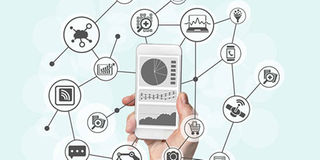Seize the Big Data moment to revolutionise education sector

Predictive analytics and big data concept. Big data is used quite significantly in higher education. ILLUSTRATION | NATION MEDIA GROUP
What you need to know:
- Colleges and universities are able to carry out intricate analysis — including student behaviour, testing results and career development.
- With Africa experiencing a youth population bulge against a stark unemployment backdrop, our universities need to change tack if they are to produce the graduate of the future.
The recent Huduma Namba registration and the international tiff between the United States and Chinese technology firm Huawei over the development of the 5G network shows that big data is the next frontier in technological advancement.
Big data, or what some call the ‘Fourth Industrial Revolution’, is poised to change all aspects of our lives.
From science to education, healthcare to government and commerce, the future is, undoubtedly, big data.
People with specialised skills are in urgent demand with a shortage of data talent the next concern — a godsend for our universities to take the lead in a nascent crucial field.
Institutions of higher learning are considered a fertile ground for cultivating data scientists.
5G NETWORK
Unfortunately, global statistics indicate that the education sector is playing catch-up in the adoption of big data.
Research shows the leading industries in big data use as consulting/professional services and the financial industry with a 15 per cent share each while education scores a paltry three per cent.
The anticipated global rollout of 5G is a culmination of technological advancement in computing.
High performance computing (HPC) has opened doors to aggregation of computing power in that much higher output can be got compared to that from a single device, hence mass automation of manual procedures.
HIGHER EDUCATION
The automation as a result of HPC can be classified into three categories: deterministic, which improves operational efficiencies such as payment processing; predictive, which proactively avoids business disruption like fraud detection; and cognitive, to manage knowledge in order to reduce dependency.
Africa has been missing out on these milestones and, if the situation persists, consequences will result in a huge socio-economic gap between it and other continents. Elsewhere, big data is used quite significantly in higher education.
For example, the University of Tasmania, in Australia, has deployed a learning management system (LMS) that supports student retention by tracking, among other things, when a student logs onto the system, how much time is spent on different pages in the system, as well as the overall progress of a student over time.
DATA TRAIL
The system is also used to measure teachers’ effectiveness against student numbers, subject matter, student demographics and several other variables.
The opportunities presented by big data and HPC in education are numerous. Colleges and universities are able to carry out intricate analysis — including student behaviour, testing results and career development.
One critical area in which big data can revolutionise higher learning is in improving student results.
Currently, the answers to assignments and exams are the only measurements of a student’s performance.
However, every student generates a unique data trail. As the government introduces competency-based education, which emphasises a shift from the traditional assignment- and exam-based assessment of student progress, this data trail can be analysed in real time to deliver an optimal learning environment for the student and gain a better understanding of an individual student’s behaviour.
PERFORMANCE
Big data can help to create prosperous student groups. Learners work in groups where they are not complimentary to one another.
But with algorithms, one can determine the strengths and weaknesses of a student based on how they learnt online, how and which questions were answered and social profile.
Big data also allows for customisation at colleges and universities. This can be created with blended learning — a combination of online and offline learning.
Blended learning gives students the opportunity to develop personalised programmes, following those classes that they are interested in, working at their own pace, while having access to offline guidance by professors.
Providing mass customisation in education has always been a challenge.
MONITORING
HPC allows a lecturer to monitor all students in real time, which can improve the digital textbooks and course outlines they use.
Algorithms can also monitor how students read the texts by analysing which parts are difficult or easy understand or unclear.
With Africa experiencing a youth population bulge against a stark unemployment backdrop, our universities need to change tack if they are to produce the graduate of the future.
Elsewhere, universities and colleges are turning to big data to improve overall student results and smarter students who study faster will have a positive effect on organisations and society.
The iron of big data is at its hottest; the time for our education sector to strike the hammer is now.
Dr Okanda (PhD) is the director of ICT and associate professor of computing at USIU-Africa. [email protected]




